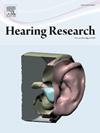Cross-sectional screening for inflammation in tinnitus with near-normal hearing
IF 2.5
2区 医学
Q1 AUDIOLOGY & SPEECH-LANGUAGE PATHOLOGY
引用次数: 0
Abstract
Tinnitus is the perception of sound without an external stimulus. Recently, inflammation has been implicated in the pathophysiology of tinnitus. In tinnitus animal models, cytokine levels are increased throughout the whole auditory pathway, and microglia and astrocytes are activated. However, only a few human studies on inflammation in tinnitus were conducted, which generally did not account for confounders such as hearing loss, anxiety and depression. The current study therefore aimed to evaluate the association between inflammation and tinnitus specifically in participants with (near-)normal hearing and without signs of anxiety or depression.
In this cross-sectional study, fifty tinnitus participants and fifty healthy controls completed a tinnitus questionnaire and underwent audiometric testing. Complete blood count measures were determined in blood plasma, as well as cytokine concentrations by using the enzyme-linked immunosorbent assay (ELISA) technique.
Platelet count and cytokine concentrations of IL-10 and IFN-γ were lower in participants with tinnitus compared to controls, and male sex, lower MCV, lower platelet count, and lower IL-10 and IFN-γ concentrations were significant predictors of tinnitus presence.
The current study shows that inflammatory parameters are altered in tinnitus patients after exclusion of important confounders such as hearing loss, anxiety, depression, and inflammatory diseases.
对听力接近正常的耳鸣患者进行炎症横断面筛查
耳鸣是在没有外部刺激的情况下对声音的感知。最近,炎症被认为与耳鸣的病理生理学有关。在耳鸣动物模型中,整个听觉通路的细胞因子水平升高,小胶质细胞和星形胶质细胞被激活。然而,关于耳鸣中炎症的人类研究为数不多,而且通常没有考虑听力损失、焦虑和抑郁等混杂因素。在这项横断面研究中,50 名耳鸣患者和 50 名健康对照者填写了耳鸣问卷,并接受了听力测试。与对照组相比,耳鸣患者的血小板计数、IL-10 和 IFN-γ 的细胞因子浓度较低,而男性性别、较低的 MCV、较低的血小板计数、较低的 IL-10 和 IFN-γ 浓度是耳鸣发生的重要预测因素。本研究表明,在排除听力损失、焦虑、抑郁和炎症性疾病等重要混杂因素后,耳鸣患者的炎症参数会发生改变。
本文章由计算机程序翻译,如有差异,请以英文原文为准。
求助全文
约1分钟内获得全文
求助全文
来源期刊

Hearing Research
医学-耳鼻喉科学
CiteScore
5.30
自引率
14.30%
发文量
163
审稿时长
75 days
期刊介绍:
The aim of the journal is to provide a forum for papers concerned with basic peripheral and central auditory mechanisms. Emphasis is on experimental and clinical studies, but theoretical and methodological papers will also be considered. The journal publishes original research papers, review and mini- review articles, rapid communications, method/protocol and perspective articles.
Papers submitted should deal with auditory anatomy, physiology, psychophysics, imaging, modeling and behavioural studies in animals and humans, as well as hearing aids and cochlear implants. Papers dealing with the vestibular system are also considered for publication. Papers on comparative aspects of hearing and on effects of drugs and environmental contaminants on hearing function will also be considered. Clinical papers will be accepted when they contribute to the understanding of normal and pathological hearing functions.
 求助内容:
求助内容: 应助结果提醒方式:
应助结果提醒方式:


